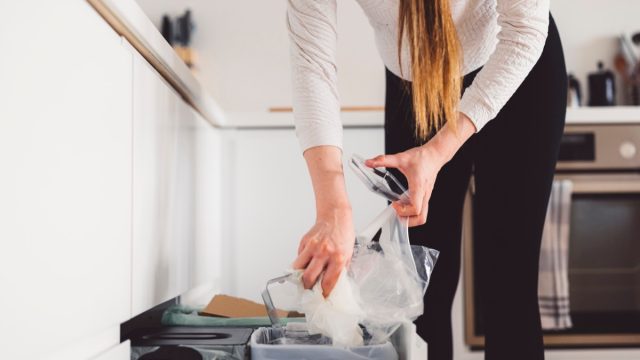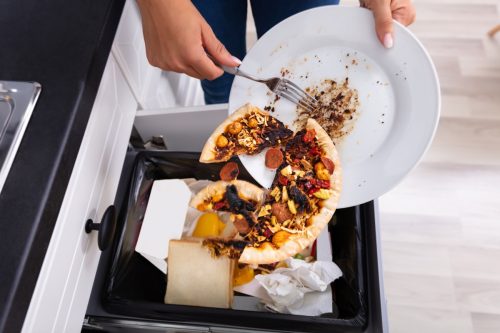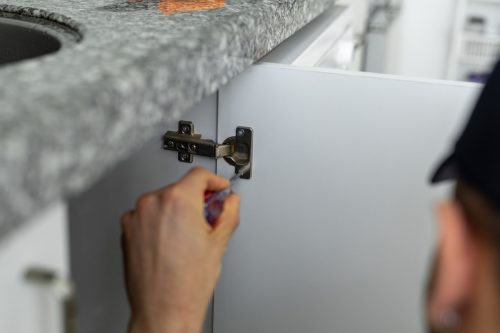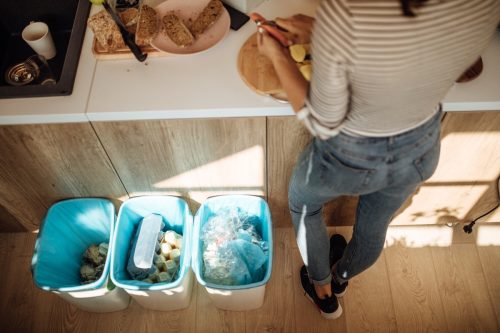Why You Should Never Keep Your Kitchen Trash Can in a Cabinet

From food packaging materials to uneaten scraps, it’s quite easy to accumulate a large amount of waste in your kitchen. The kitchen trash can quickly become an unpleasant sight (and smell) as it’s building up, so many of us avoid storing our garbage cans out in the open. As it turns out, however, your storage method could create more problems in your home than you realize. Read on to find out why experts say you should never keep your kitchen trash can in a cabinet.
READ THIS NEXT: 6 Items You Should Always Have in Your Kitchen When Guests Come Over.
Experts advise against keeping your kitchen trash can inside your cabinets.

Keeping your kitchen trash can tucked away in a cabinet can certainly fix the issue of its unsightly appearance in your space. But that’s about all it will do for you. In fact, Valentine Ross, a cleaning expert working with residential cleaning company Milton Maids, tells Best Life that storing your garbage like this “often creates more problems than it solves.”
“One of these issues is that spills and misses are much more likely to happen,” Ross notes. “And cleaning them up can be a bigger hassle than with a freestanding trash can.”
It’s also inconvenient in other ways, according to Chris Matthias, an interior designer and the founder of House Adorable.
“As you are cooking, prepping, and chopping stuff, you have to be opening again and again, and again, a cabinet door and it all just gets messy, especially if you have your hands dirty,” he explains. “I also find that there’s another major problem with trash hidden inside a cabinet: Most people forget that it is there. If it’s out of sight, it’s out of mind, and there are more chances of you forgetting to take out the trash.”
This storage solution can also create health concerns.

Keeping waste hidden inside a cabinet might not only be inconvenient—it could also put your health at risk due to the poor air circulation, according to Michael Golubev, a health expert and the CEO of Mold Busters.
“Cabinets often have limited air circulation, which can lead to a buildup of moisture and humidity,” Golubev explains. “Combined with the organic waste found in trash cans, this creates the perfect environment for mold growth.”
As food waste ferments in this enclosed space, it can also become a breeding ground for bacteria and germs, says Gretchen Boyd, a cleaning expert and president of NYC House Cleaners.
“This can lead to health concerns and create a foul smell that can permeate the kitchen,” she warns.
For more home advice delivered straight to your inbox, sign up for our daily newsletter.
It may damage your cabinets, too.

Jay Sanders, a contractor and owner of home remodeling company Castle Dream Construction, says he has seen houses that are less than 10 years old start to deteriorate because of the mold created from kitchen trash can storage.
“Hiding the trash inside a wood cabinet can create an environment that is perfect for the growth of mold and mildew,” he reiterates. “Once mold is present, there is a good chance of it spreading to nearby areas, contaminating other cabinets, walls, and floors.”
The material of cabinets is highly porous, and this allows for easier contamination, according to Sanders.
“Trash cans often contain wet substances, old food, and other semi-hazardous waste components that when mixed together create gases that get trapped inside the cabinet, causing them to prematurely break down over a short period,” he adds.
Experts recommend keeping your trash in a well-ventilated space.

Due to these potential issues, keeping your garbage outside of any cabinets is a good rule of thumb.
“Keeping a trash can in an enclosed space is generally not recommended, regardless of the size or type of space,” Justin Carpenter, a cleaning expert and the owner of Modern Maids in Houston, confirms. “People should consider keeping their kitchen trash cans outside the cabinet in a more open area with adequate ventilation.”
Golubev recommends storing the trash in a corner of your kitchen or near a window, as both of these places are well-ventilated.
“Choose a trash can with a tight-fitting lid to reduce odors and prevent pests from accessing the contents,” he advises. “Remember to clean the trash can and the surrounding area regularly to prevent mold growth and maintain a healthy home environment.”